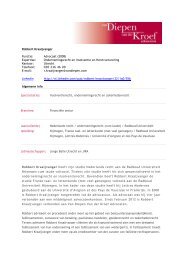© Van Diepen Van der Kroef Advocaten
© Van Diepen Van der Kroef Advocaten
© Van Diepen Van der Kroef Advocaten
- No tags were found...
You also want an ePaper? Increase the reach of your titles
YUMPU automatically turns print PDFs into web optimized ePapers that Google loves.
conflicting norms is necessary because there are insufficient grounds for accepting a fulland unconditional priority of international-law obligations of the State un<strong>der</strong> the UNCharter over other international-law obligations of the State. The rule of Article 103 of theUN Charter invoked by the State does not always and without more bring relief in the eventof conflicting obligations of a peremptory character (ius cogens) or conflicting human rightsobligations of an international customary law nature.’Explanation of ground of appeal 10125. The opening sentence of legal consi<strong>der</strong>ation 5.16 is a summary of earlier legalconsi<strong>der</strong>ations against which the Association et al. has directed separate grounds of appeal.The incorrectness of earlier legal consi<strong>der</strong>ations is also the incorrectness of the openingsentence of legal consi<strong>der</strong>ation 5.16. Beside that the following applies.It appears from the above grounds of appeal and the explanation thereto that the DistrictCourt has erroneously left essential provisions of the UN Charter, the Vienna Convention onTreaties, caselaw and literature out of consi<strong>der</strong>ation in its judgment. The District Courtshould have reviewed already in the framework of the interpretation of Article 105paragraph 1 of the UN Charter whether that interpretation did justice to, for example,Article 6 ECHR. It is after all not imaginable that the UN Charter would have to beinterpreted as being in conflict with that Article.Indeed, Article 105 paragraph 1 of the UN Charter expressly refers to the purposes of theUnited Nations, which Article specifies the protection of human rights as a purpose of theUnited Nations. Article 105 paragraph 1 of the UN Charter is merely a means forimplementation of those purposes. Only where immunity would constitute a purpose in itself– a notion that is not supported by either the text of the import of Article 1 of the UNCharter – should there be room to weigh immunity against the norms of Article 6 ECHR.126. The District Court correctly observed that it was not self-evident that the UN Charter haspriority over other treaty obligations or human rights. The Association et al. notes in thatcontext that it manifests a much too restrictive interpretation of one’s task that the Stateof the Netherlands (and with it: its body the Public Prosecutor’s Department) showed no<strong>©</strong> <strong>Van</strong> <strong>Diepen</strong> <strong>Van</strong> <strong>der</strong> <strong>Kroef</strong> <strong>Advocaten</strong> page 55 of 99
















